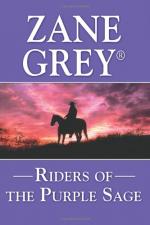“I tried to mill the herd jest as Lassiter did. But I wasn’t equal to it, Miss Withersteen. I don’t believe the rider lives who could hev turned thet herd. We kept along of the herd fer miles, an’ more ’n one of my boys tried to get the steers a-millin’. It wasn’t no use. We got off level ground, goin’ down, an’ then the steers ran somethin’ fierce. We left the little gullies an’ washes level-full of dead steers. Finally I saw the herd was makin’ to pass a kind of low pocket between ridges. There was a hog-back—as we used to call ’em—a pile of rocks stickin’ up, and I saw the herd was goin’ to split round it, or swing out to the left. An’ I wanted ’em to go to the right so mebbe we’d be able to drive ’em into the pocket. So, with all my boys except three, I rode hard to turn the herd a little to the right. We couldn’t budge ’em. They went on en’ split round the rocks, en’ the most of ’em was turned sharp to the left by a deep wash we hedn’t seen—hed no chance to see.
“The other three boys—Jimmy Vail, Joe Willis, an’ thet little Cairns boy—a nervy kid! they, with Cairns leadin’, tried to buck thet herd round to the pocket. It was a wild, fool idee. I couldn’t do nothin’. The boys got hemmed in between the steers an’ the wash—thet they hedn’t no chance to see, either. Vail an’ Willis was run down right before our eyes. An’ Cairns, who rode a fine hoss, he did some ridin’. I never seen equaled, en’ would hev beat the steers if there’d been any room to run in. I was high up an’ could see how the steers kept spillin’ by twos an’ threes over into the wash. Cairns put his hoss to a place thet was too wide fer any hoss, an’ broke his neck an’ the hoss’s too. We found that out after, an’ as fer Vail an’ Willis—two thousand steers ran over the poor boys. There wasn’t much left to pack home fer burying!...An’, Miss Withersteen, thet all happened yesterday, en’ I believe, if the white herd didn’t run over the wall of the Pass, it’s runnin’ yet.”
On the morning of the second day after Judkins’s recital, during which time Jane remained indoors a prey to regret and sorrow for the boy riders, and a new and now strangely insistent fear for her own person, she again heard what she had missed more than she dared honestly confess—the soft, jingling step of Lassiter. Almost overwhelming relief surged through her, a feeling as akin to joy as any she could have been capable of in those gloomy hours of shadow, and one that suddenly stunned her with the significance of what Lassiter had come to mean to her. She had begged him, for his own sake, to leave Cottonwoods. She might yet beg that, if her weakening courage permitted her to dare absolute loneliness and helplessness, but she realized now that if she were left alone her life would become one long, hideous nightmare.




